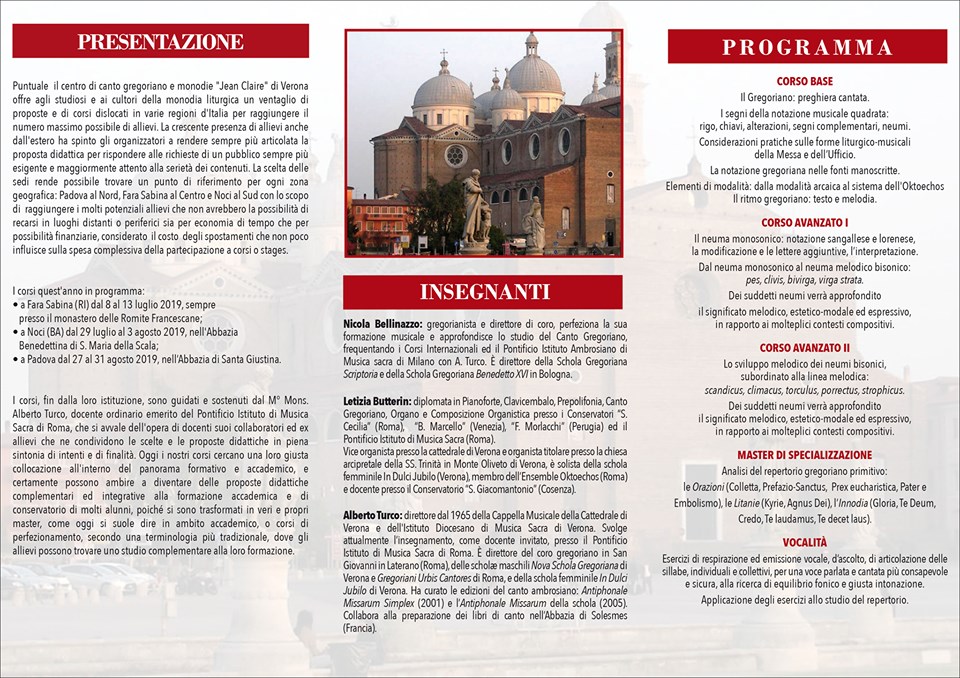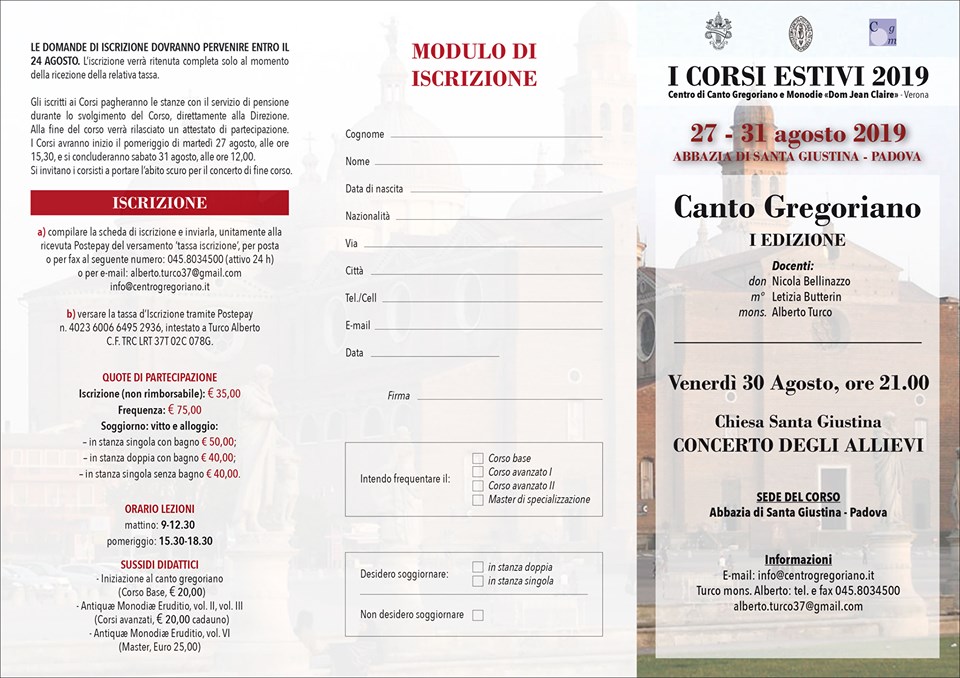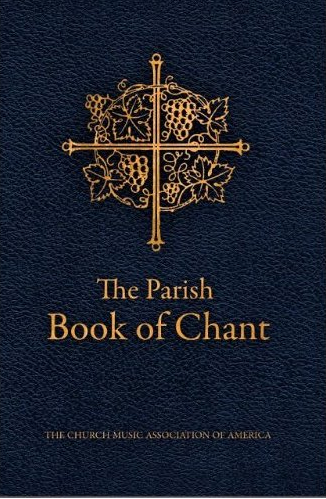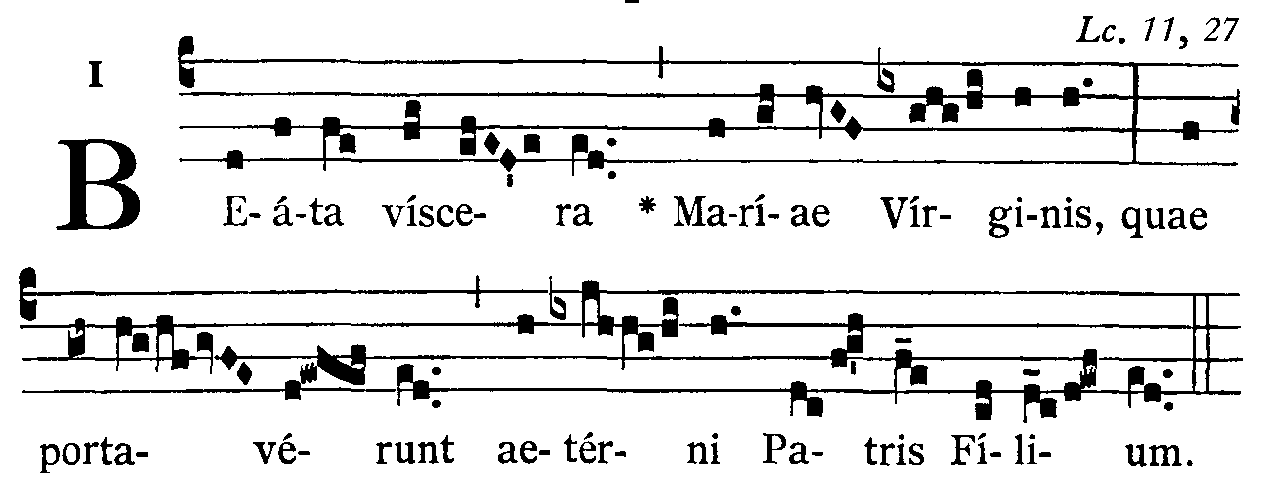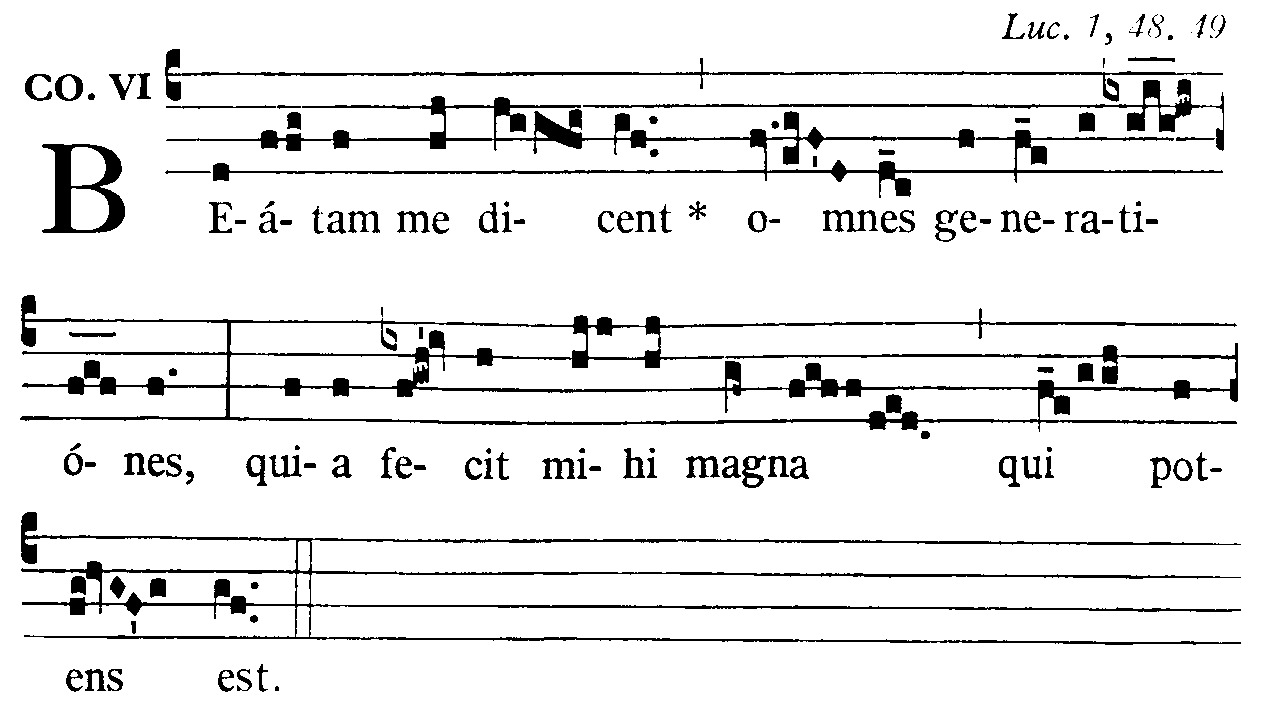Mese: Agosto 2019
St. Jude Thaddeus, Pharr, Texas (Diocese of Brownsville)
Every Sunday the 9:30 AM Mass is celebrated in Latin.
505 S. Ironwood Street
Pharr, Texas 78577
(956)781-2480
Parish Book of Chant
The Parish Book of Chant is published by the Church Music Association of America as a unique resource for choirs, priests, families, and congregations who seek to sing and understand the universal musical tradition of Catholic people. It is a 6×9″ hardbound volume, 350 pages, with a very beautiful cover and outstanding print quality. It is published under the Creative Commons attribution license 3.0, which means that you can copy, distribute, record, or distribute electronic files with no restrictions and no license whatsoever. It is published as part of the commons of the faith.
It has been developed with the hope of bringing to life, in every parish and home, what the Second Vatican Council called a “treasure of inestimable value,” which is our Gregorian tradition of song.
It is compiled and expertly typeset by Richard Rice (Communio) with the assistance of the CMAA and many people involved in sacred music in the United States.
It is available direct from CMAA or from Paraclete Press. If you have questions or special requests or want to place a bulk order, call the CMAA at 505-263-6298.
You can examine the entire contents in this full PDF.
Among its features:
- It contains a complete order of Mass for both the Ordinary form of the Roman Rite and the Extraordinary form, in side-by-side Latin and English. The Ordos include the sung responses of the people and celebrant. In this respect, it serves as an ideal resource for parishes that use both forms or simply hope to emphasize the relationship between them.
- This edition is dramatically improved over the 1st edition with expanded Kyriale, Sequences, litanies, Communion Propers, full chant hymn verses, ribbons, tutorial, and the fully and updated ordo to the ordinary and extraordinary forms of the Mass. It is a marvelous production, essential for every schola because it includes all the basic chant repertoire.
- It contains the full Kyriale, which is a collection of chants that make up the “ordinary” of the Mass: Kyrie, Gloria, Credo, Sanctus, and Agnus Dei. These are the main sung parts of the Mass that are used throughout the year and the parts that all people are invited to learn and sing. This includes the full Credos in addition to many Mass settings that have been beloved for the dominant part of Catholic history all over the world.
- It collects 71 Latin chants, with English translations, that are for occasional use in Mass in various seasons of the year, such as hymns for Advent, Christmas, Lent, Easter, Pentecost, as well as Marian hymns and chants for funerals and other occasions. These are hymns that constitute the most serviceable of the repertory, have inspired composers for 10 centuries, and have been in the minds and hearts of Catholics for generation after generation.
- All music is set on four-line staffs with newly typeset neumes that make the music crystal-clear for singing.
- It includes a 7-page tutorial on singing chant that is invaluable for the beginner and can also teach the more advanced singer. It teaches understanding of signs, melodies, style, rhythms, and modes, all in a very brief section at the back of the book.
- Additional features include the order of service for Benediction, Gospel canticles, litanies, and Alleluias for both forms.
These features were chosen with the parish experience in mind. There is no existing resource that combines them into a single volume: the Mass, the people’s music, tutorial, and translations. Again, this is not a reprint but a newly created book that offers the core of the people’s Gregorian music. This book could be the most valuable resource yet produced to help Gregorian chant assume its “pride of place” in Catholic liturgy.
It is our sincere hope that this book will make possible the full integration of Gregorian chant, as sung by the people, into both forms of the Roman Rite in English-speaking countries.
Ad Orientem and Absolutism
Despite half a century of deprecation and de facto prohibition, the desire for ad orientem worship continues to grow, especially among younger priests and lay faithful. Why? Partly, no doubt, the practice’s fall into relative desuetude has given us the privilege of discovering it anew. The more basic and adequate explanation, however, is obvious: it continues to strike a profound chord in the human heart. In a culture of talking heads and information overload, of emotional manipulation and manufactured fellowship, of mutual admiration societies and collective navel-gazing, it’s hardly surprising that many people want to opt out of the cult of personality; that they want to pray with instead of being prayed at; that they want to gaze, together and as one, beyond themselves.
Read the full article by Fr. Charles Shonk, O.P. here.
In Assumptione Beatæ Mariæ Virginis
Sollemnitas
Ad Missam in Vigilia
Hæc Missa dicitur vespere diei 14 augusti, sive ante sive post I Vesperas sollemnitatis.
Ant. ad introitum
Gloriósa dicta sunt de te, María,
quæ hódie exaltáta es super choros Angelórum,
et in ætérnum cum Christo triúmphas.
Dicitur Glória in excélsis.
Collecta
Deus, qui beátam Vírginem Maríam,
eius humilitátem respíciens, ad hanc grátiam evexísti,
ut Unigénitus tuus ex ipsa secúndum carnem nascerétur,
et hodiérna die superexcellénti glória coronásti,
eius nobis précibus concéde,
ut, redemptiónis tuæ mystério salváti,
a te exaltári mereámur.
Per Dóminum.
Dicitur Credo.
Super oblata
Súscipe, quǽsumus, Dómine,
sacrifícium placatiónis et laudis,
quod in sanctæ Dei Genetrícis Assumptióne celebrámus,
ut ad véniam nos obtinéndam perdúcat,
et in perpétua gratiárum constítuat actióne.
Per Christum.
Præfatio: De gloria Mariæ Assumptæ.
Ant. ad communionem Cf. Lc 11, 27
Beáta víscera Maríæ Vírginis,
quæ portavérunt ætérni Patris Fílium.
Post communionem
Mensæ cæléstis partícipes effécti,
implorámus cleméntiam tuam, Dómine Deus noster,
ut, qui Assumptiónem Dei Genetrícis cólimus,
a cunctis malis imminéntibus liberémur.
Per Christum.
Adhiberi potest formula benedictionis sollemnis.
Ad Missam in die
Ant. ad introitum Cf. Apoc 12, 1
Signum magnum appáruit in cælo:
múlier amícta sole, et luna sub pédibus eius,
et in cápite eius coróna stellárum duódecim.
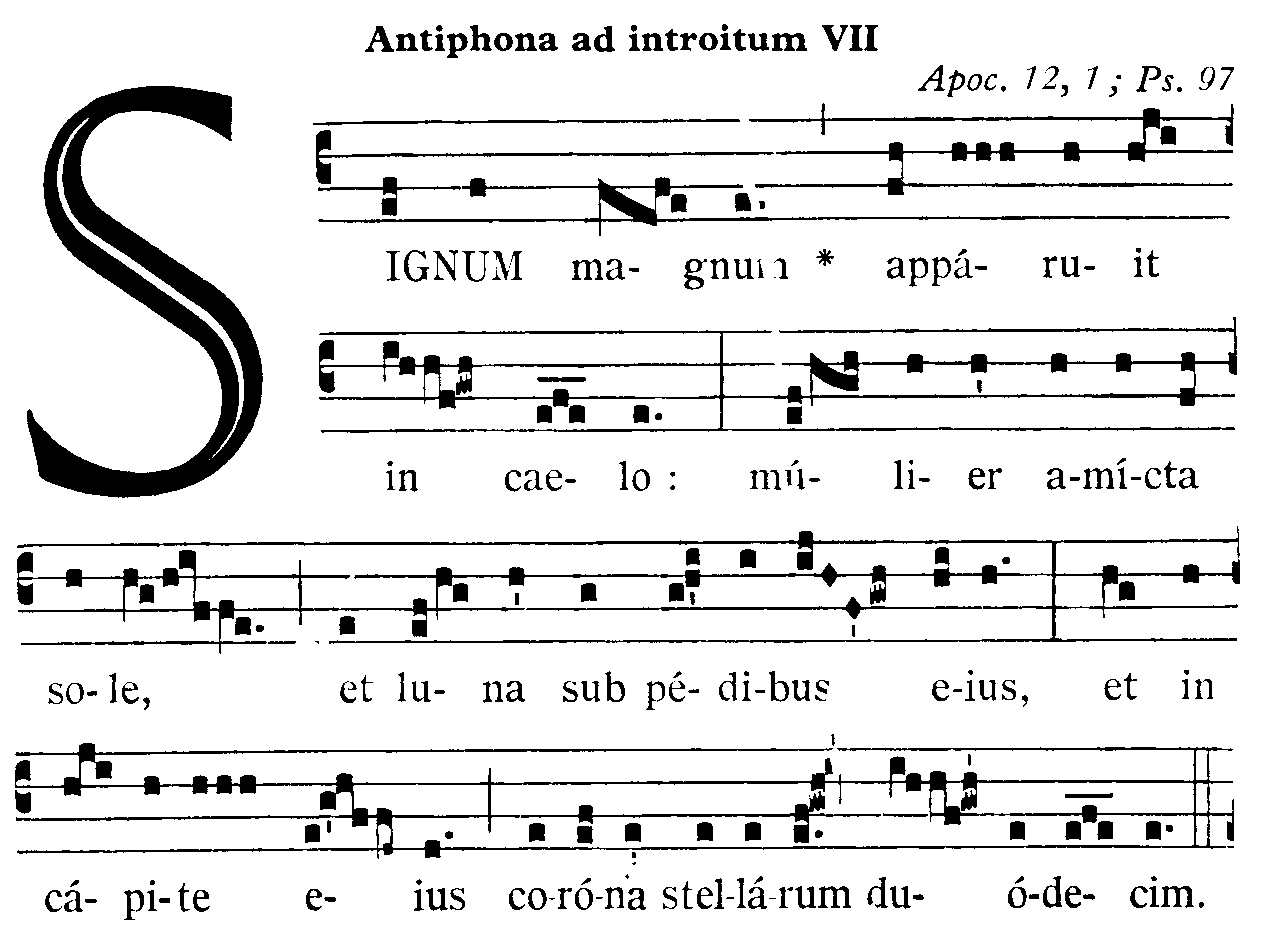
Vel:
Gaudeámus omnes in Dómino,
diem festum celebrántes sub honóre Maríæ Vírginis,
de cuius Assumptióne gaudent Angeli,
et colláudant Fílium Dei.
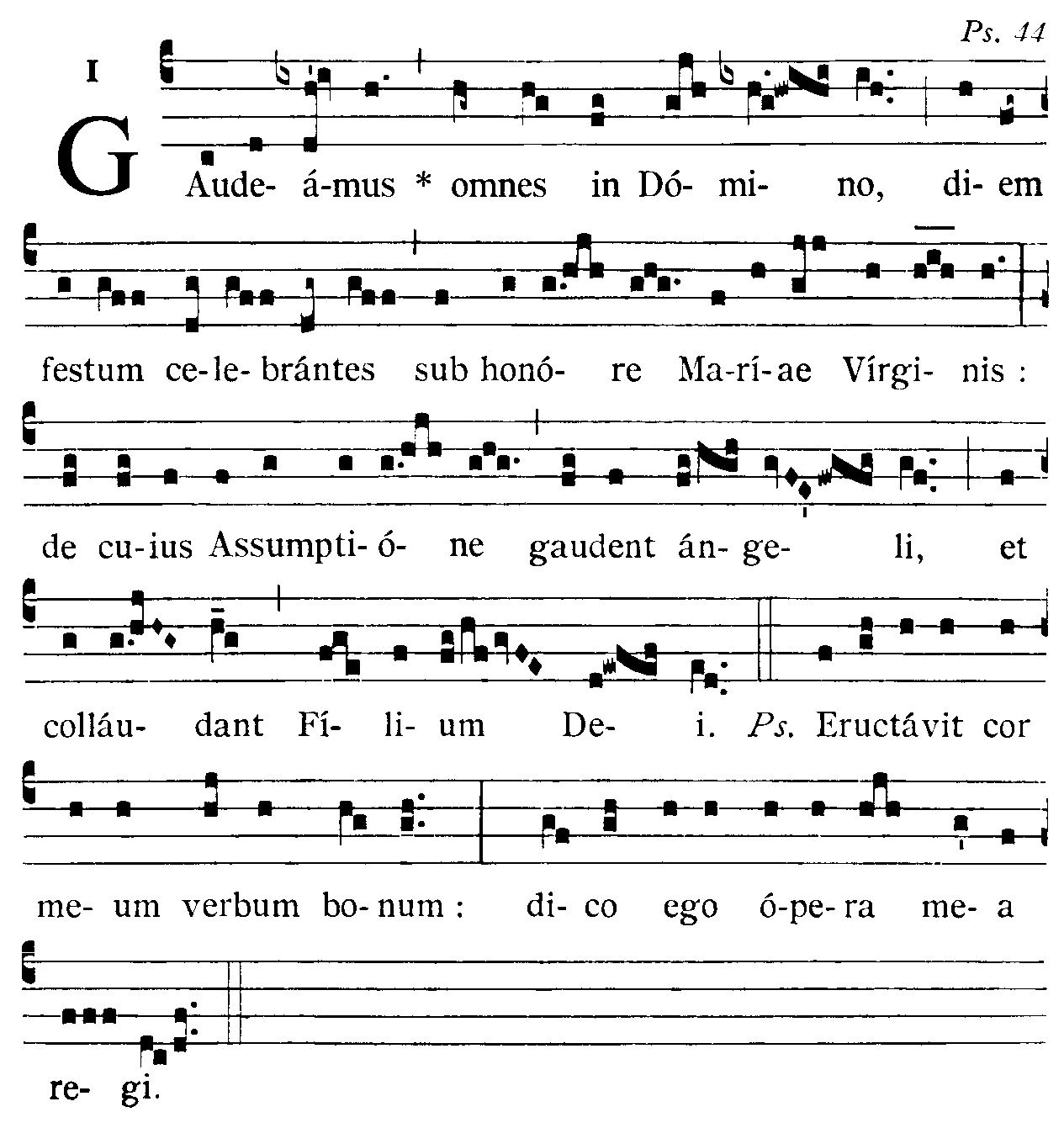
Dicitur Glória in excélsis.
Collecta
Omnípotens sempitérne Deus,
qui immaculátam Vírginem Maríam, Fílii tui Genetrícem,
córpore et ánima ad cæléstem glóriam assumpsísti,
concéde, quǽsumus, ut, ad supérna semper inténti,
ipsíus glóriæ mereámur esse consórtes.
Per Dóminum.
Dicitur Credo.
Super oblata
Ascéndat ad te, Dómine, nostræ devotiónis oblátio,
et, beatíssima Vírgine María
in cælum assúmpta intercedénte,
corda nostra, caritátis igne succénsa,
ad te iúgiter aspírent.
Per Christum.
Præfatio: De gloria Mariæ Assumptæ.
Ant. ad communionem Lc 1,48-49
Beátam me dicent omnes generatiónes,
quia fecit mihi magna qui potens est.
Post communionem
Sumptis, Dómine, salutáribus sacraméntis,
da, quǽsumus,
ut, intercessióne beátæ Maríæ Vírginis in cælum assúmptæ,
ad resurrectiónis glóriam perducámur.
Per Christum.
Adhiberi potest formula benedictionis sollemnis.
© Copyright – Libreria Editrice Vaticana
Messalino in PDF con letture in lingua italiana (da stampare su fogli A3 fronte/retro)
Archives of Sacred Music Journal
Archives of the journal Sacred Music from 1965 to last year are listed here, and most are available for download in PDF format.
Dominica XIX “per annum” – 11 Aug 2019
Ant. ad introitum Cf. Ps 73, 20.19.22.23
Réspice, Dómine, in testaméntum tuum,
et ánimas páuperum tuórum ne derelínquas in finem.
Exsúrge, Dómine, et iúdica causam tuam,
et ne obliviscáris voces quæréntium te.
Collecta
Omnípotens sempitérne Deus,
quem, docénte Spíritu Sancto,
patérno nómine invocáre præsúmimus,
pérfice in córdibus nostris spíritum adoptiónis filiórum,
ut promíssam hereditátem íngredi mereámur.
Per Dóminum.
Super oblata
Ecclésiæ tuæ, Dómine, múnera placátus assúme,
quæ et miséricors offerénda tribuísti,
et in nostræ salútis poténter éfficis transíre mystérium.
Per Christum.
Ant. ad communionem Ps 147, 12.14
Lauda, Ierúsalem, Dóminum,
qui ádipe fruménti sátiat te.
Vel: Cf. Io 6, 51
Panis, quem ego dédero,
caro mea est pro sǽculi vita,
dicit Dóminus.
Post communionem
Sacramentórum tuórum, Dómine,
commúnio sumpta nos salvet,
et in tuæ veritátis luce confírmet.
Per Christum.
© Copyright – Libreria Editrice Vaticana
Messalino in PDF con letture in lingua italiana (da stampare su fogli A3 fronte/retro)

